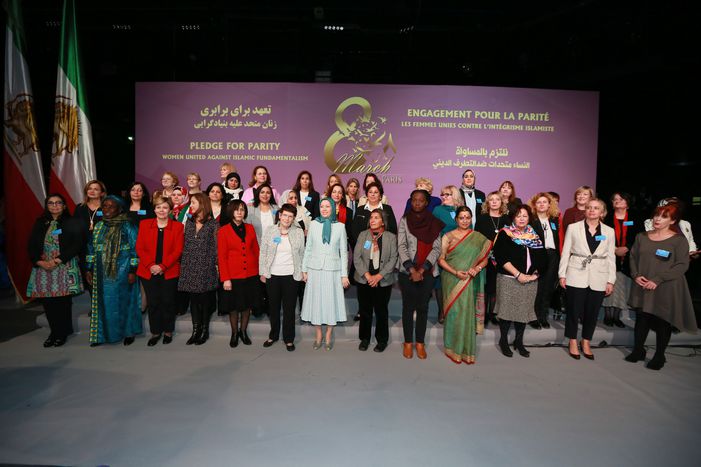
The unprecedented France Culture documentary about Iran's resistance movement
Published on
Translation by:
Gabriela Amundarain Last Tuesday, May 31, on its program “Sur les Docks,” France Culture broadcasted a documentary titled "The Voices of Iran’s Resistance," directed by Olivier Steiner and Assia Khalid.
Last Tuesday, May 31, on its program “Sur les Docks,” France Culture broadcasted a documentary titled "The Voices of Iran’s Resistance," directed by Olivier Steiner and Assia Khalid.
In this new documentary, author Olivier Steiner gives a voice to Iranian members and supporters of the Iranian Resistance and the emblematic figure of resistance Maryam Rajavi, as well as French citizens, intellectuals, and politicians who support this cause.
The testimonies of Iranian citizens, victims of the theocratic regime, give realism and a force to the story of repression and the struggle against it, while the words of their supporters illuminate the media and political reality that tends to obscure the gravity of the situation in Iran. At the heart of the story, in which women, oppressed and combative, have a key role, is Camp Ashraf, a city in the desert in Iraq near the Iranian border, with its hospitals, cultural centers, universities –a place that gushes with the hope of a democratic revolution– and camp Liberty, an exile camp surrounded and attacked repeatedly, where Iranian dissidents withstand pressures.
Behzad Naziri, former Iranian journalist exiled in France, narrates the reclamation of the protest movement against the Shah’s regime, generated by Ayatollah Khomeini, who at first received some assurance on the part of intellectuals, just as the bloody repression in 1982 killed his sister, a young People's Mujahedin activist. According to Mr. Naziri, the Iranian regime felt particularly threatened by women, who were first in line to defend their rights: "women were the first, they were very organized in the Shah's overthrowing process and secondly, from the moment women saw that misogyny was the main feature of the Khomeini regime… (...) both of us were in the prisons of Khomeini, as journalists, but thirty-five years later, I stand before you, I speak, and my sister is gone. She was a woman, and she was tortured in a more atrocious manner that a man in the prisons of Khomeini."
Elham Zandjani, former resident of Ashraf, evokes the democratic way of life of the Ashraf camp, destroyed by Iraqi envoys of the mullahs’ regime that came to "eliminate everyone." "We had two very simple choices: we could flee, put down our arms, and we had the choice to resist, to say no."
The personal commitment of Rama Yade happened after her term as Secretary of State for Foreign Affairs; she attests to the "schizophrenic exercise" waged by Western policy, alienated by economic and diplomatic interests, "since there is an economic predation on Iranian markets everyone pretended not to see anything, and French media are now broadcasting prime time reports on Iran again.” For Mrs Yade, the economic argument is in fact inconsistent: "I have brought up this contradiction and I think we can overcome it, because, in fact, it is not a matter of economic interests against values, because our values are our best interests. And, from experience, I saw that when it was decided not to mention the question of human rights with a particular dictator, on the grounds that we should sign contracts to create jobs in France –the ultimate argument– well, in the end we did not sign contracts. We did not sign the contracts, because the resistance was organized elsewhere, that is to say in the press, in NGOs, in public opinion."
The testimony of Shaghyegh Azimi, a 23-year-old activist exiled since she was 16, reveals a dynamic youth, rebellious and supported by social networks, fundamental tool for a new form of struggle and exchange of ideas. The young lady also mentions the importance of the resistance’s TV channel broadcast from abroad, which is very popular in Iran despite the ban: "There is a television channel that is close to the NCRI, called Sima-ye Azadi, the face of freedom (...). It let me see something really different through TV. For example, the female presenters in television, the way they were serious, the way they were sure of themselves, or just the many women in various areas, especially in those prohibited for women in Iran; they could do so in the Resistance in Ashraf, it was possible. This television channel is banned in Iran. They arrest people who watch it; there are often police raids that target families. (...) For all supporters of the mujahideen, especially young people, it was a vital duty to watch this channel."
The interventions of Maryam Rajavi recall the commitment of NCRI to a free and democratic Iran through the adoption of programs in favor of equality, freedom, and respect for human rights: universal suffrage, abolition of the death penalty, separation of church and state... In the face of a misogynist regime whose vision is no different from that of Daesh, women's leadership is intensely discussed in the documentary. and Mrs. Rajavi asserts: "we recognize full equality between women and men in all political, social and legal aspects, but especially in the equal participation of women in the country's leadership."
So hats off to France Culture’s show On the Docks, which let us discover an often ignored aspect of Iranians and their resistance to the Ayatollahs.
Translated from Le documentaire inédit de France Culture sur la Résistance en Iran



